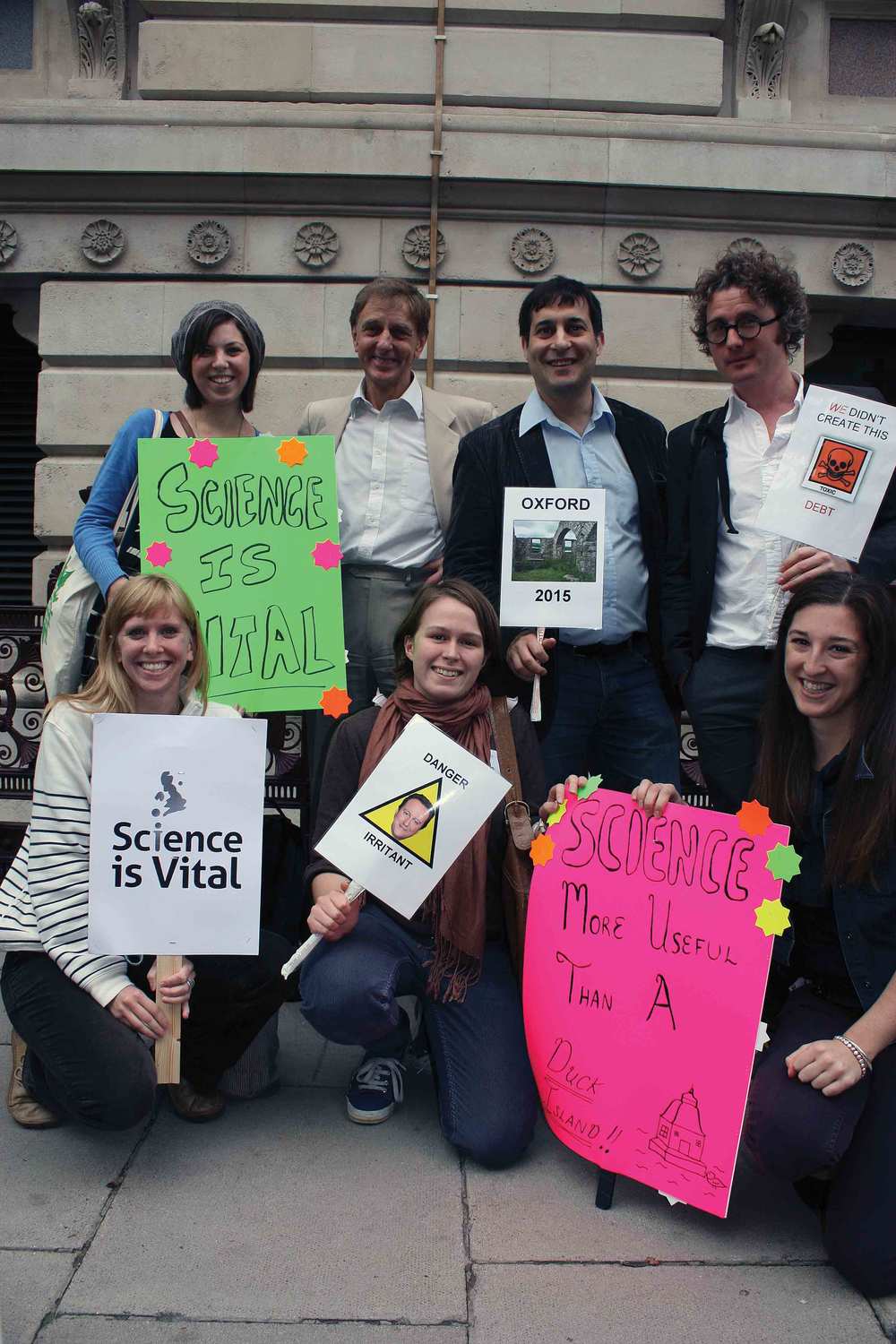Defend our geeks
Protesters descended on the Treasury for the ‘Science is Vital’ rally last Saturday to fight for science funding

Is science vital? Imperial students most certainly think so.
Last Saturday over 2,000 scientists and supporters, with a large contingent from Imperial College, took to the streets outside Whitehall to protest against proposed cuts to the UK science research budget.
The event was the brainchild of Dr Jenny Rohn, who set up the campaign only two weeks ago, following Vince Cable’s now infamous remarks calling for scientists to abandon work that was “neither commercially useful nor theoretically outstanding” at Queen Mary, University of London (Full story: Felix, Issue 1468, Scientists Rally to Fight Funding Cuts, 8th October 2010).
The ‘Science is Vital’ campaign is supported by former Imperial College Rector Sir Roy Anderson and has Professor Stephen Curry of Imperial College London on its organising committee. It is also supported by Imperial College Union (indeed Sabbaticals from the Union attended the demonstration).
The campaign has also received much support from CaSE (The Campaign for Science and Engineering in the UK), whose director, former Imperial Student Imran Khan, says the rally will “finally force politicians to take scientists seriously”.
Mr Khan stressed that the cuts “will not just have a detrimental economic effect, but a political one too”.
[Politicians] must not be allowed to compromise our future by making cuts to the science research budget Imran Khan, Director of the Campaign for Science and Engineering
In a powerful speech, he claimed “the UK already does science on a shoe-string” and that politicians “must not be allowed to compromise our future by making cuts to the science research budget”.
Other speakers at the event included science writers Ben Goldacre and Simon Singh, who highlighted that UK science currently “punches seriously above its weight” and warned that “we face taking a severe backward step”, should the proposed cuts occur.
These sentiments were echoed by campaign founder Dr Rohn, who warned of the UK’s danger of “shooting itself in the foot” and issued a rousing call to arms, telling scientists: “we cannot afford to hide in our labs anymore – we are a political block and we must make our voices heard”.
Other speakers at the rally warned of a potential “brain drain”, reminiscent of the 1980s exodus when scientists left the UK in droves to pursue research at better-funded institutions abroad.
The fear is that, in stark contrast to the current situation, where three Nobel prizes have recently been awarded to researchers working in the UK (two of whom are in fact of Russian origin), the cuts will mean that we will cease to be able to attract the best scientists from around the world.
Yet perhaps even more worryingly, should the cuts be as severe as many analysts predict, there is a danger that our top scientists will start to leave the UK for greener pastures: pastures where science research receives the funding it so fully deserves.
Other countries are pumping money into science as a way to boost their economic recovery
This danger is accentuated by the fact that, at a time when the UK is considering cutting its science research budget, other countries are pumping money into science as a way to boost their economic recovery.
Barack Obama for one has made his feelings about the necessity of well-funded research quite clear: “At such a difficult moment, there are those who say we cannot afford to invest in science, that support for research is somehow a luxury at moments defined by necessities. I fundamentally disagree. Science is more essential for our prosperity, our security, our health, our environment, and our quality of life than it has ever been before.”
French President Nicolas Sarkozy was also supportive of funding science research in a speech made this summer: “Science is, I am well aware, a fragile enterprise and scientists must be defended against obscurantism, fanaticism, wilful ignorance and contempt for the truth. The economic downturn should not prompt us to postpone investment in science, but rather to bring it forward and consolidate it.”
Yet, perhaps the most damming criticism of the UK government’s plan to cut science research funding came not from a world leader, or even from a scientist, journalist or politician, but instead came simply from the daughter of a recent Alzheimer’s victim.
Vivienne Hill, whose mother died in April, was speaking at the rally as a champion of the UK Alzheimer’s Research Trust, claims that there is a dirty little secret that the government does not want us to know.
The UK is currently second only to Holland in terms of the proportion of its population who give money to medical research charities. This fact has, in her opinion, led the government to believe that any cuts made to funding medical research will be compensated for by the generosity of UK citizens.
She says, “The government simply expects the public to pick up the slack.” Plainly, such exploitation of public kindness cannot be tolerated.
Within a matter of just two weeks, the ‘Science is Vital’ campaign managed to mobilise over 2,000 supporters for last weekend’s rally and its online petition now has over 28,000 signatures.
By the time this goes to press, the group will also have lobbied parliament.
However, the scientists’ pleas may still prove to have fallen on deaf ears when George Osborne‘s Governmental Spending Review is published next Thursday.
UK scientists can no longer be accused of taking refuge in their ‘ivory towers’ and refusing to engage in public debate
Yet, at least one thing is for sure; UK scientists can no longer be accused of taking refuge in their ‘ivory towers’ and refusing to engage in public debate.
Perhaps the most important point to come out of the rally is that UK scientists have taken their first major step in engaging and communicating their work to the public at large.
In the past, the science community has hardly been held up as a paragon of good PR skills. Yet, it would now seem that more and more scientists are finally realising that their ability to communicate with, and be held accountable by the public at large is an increasingly important element of the role they have to play in today’s modern liberal democracy.
At the very least, the rally induced a few translucent-skinned science geeks to leave the lab and seek new frontiers and horizons in the fabled world of ‘outdoors’. Who knows, one day they may even return?








